Campbell House News
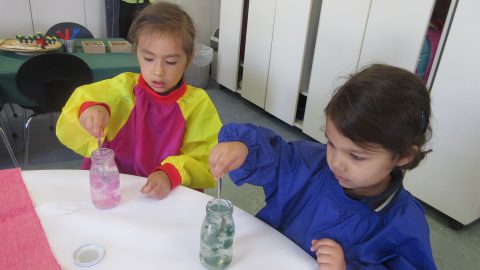
‘Kindness Potions’ – A Sensory Experience
During indoor program, the Wattle Room children have created rainbow coloured ‘kindness potions.’ The kindness potions are colour coded sensory bottles which the children are utilising to learn about what makes a kind and caring heart. The children were inspired to do so, after reading a picture storybook entitled, ‘The Story of the Kindness Elves’. This learning experience has become a fun way to learn about science and literacy through a mindset of awe and wonder. These colour-coded sensory bottles now make a wonderful tool for reflection, mindfulness and a calming influence in the classroom.
Each colour from the storybook represents an element of kindness:
Red= Kindness
Orange = Joy
Yellow = Love
Green = Patience
Blue = Peace
Purple = Gentleness
Pink = Compassion
This learning experience has acted as a scientific demonstration, allowing the children to discuss why glitter falls slowly inside the bottles and what other ingredients, such as glue, have helped create consistency and texture. The children were encouraged to add only glitter to water as a point of comparison, which showed that it fell quickly and did not swirl around in the same way. The potions have become a meaningful tool in the Wattle Room for prompting discussions about feelings, kind character traits and mindfulness.
-
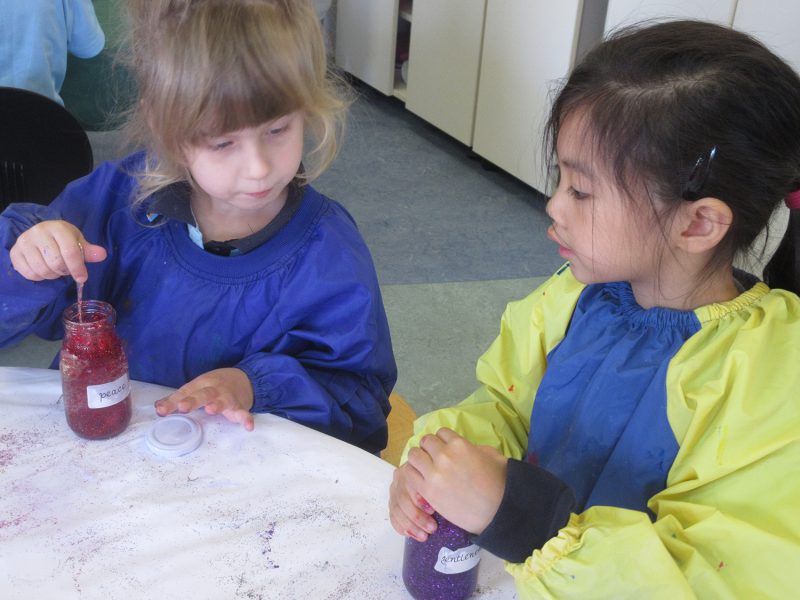
Lucy Venema and Marianna Qin
-
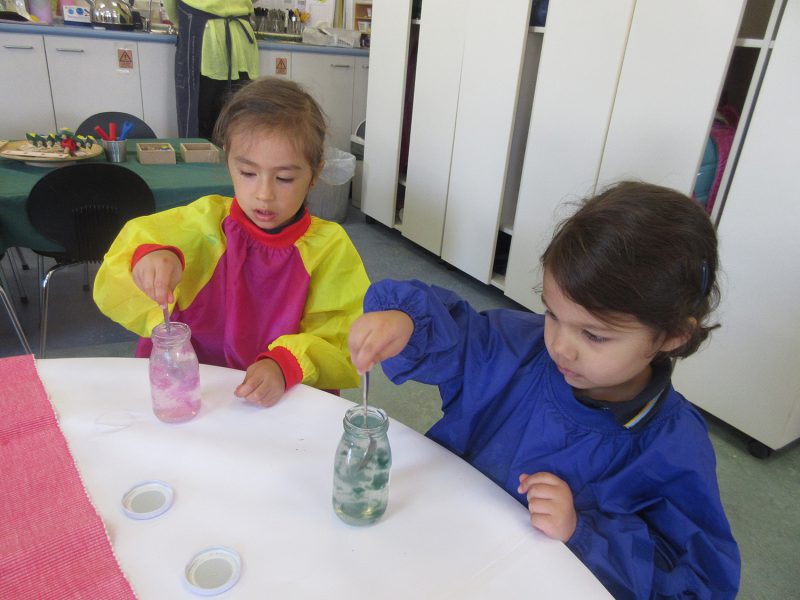
Eva Franes Cid and Charlotte Ranchod
-
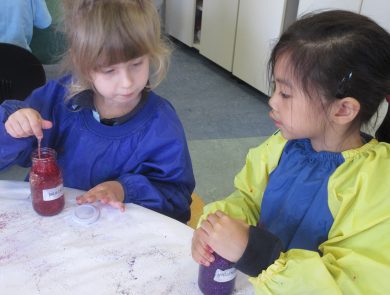
Lucy-Venema-and-Marianna-Qin
-
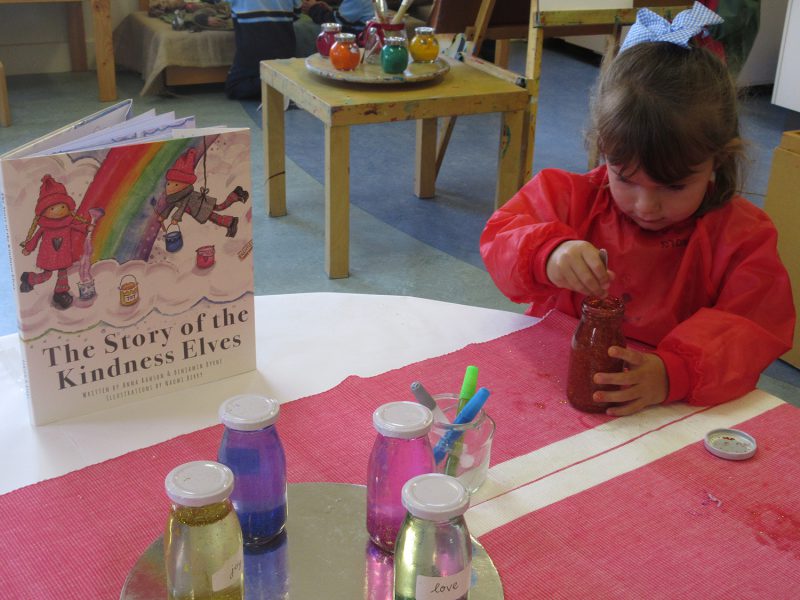
Samara Grinsell
-
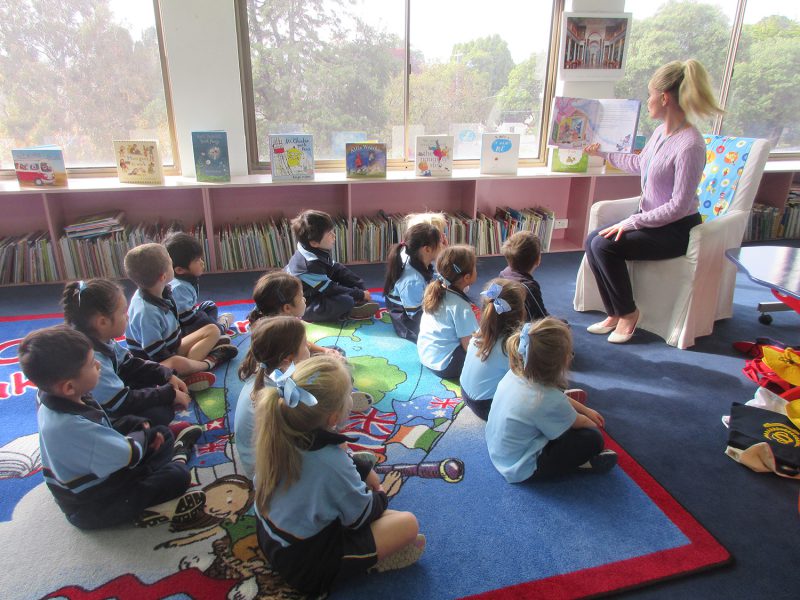
Wattle Room Children
Kristina Schrader, Wattle Room Teacher
Playing and learning are great partners!
The time to play is essential in terms of wellbeing and learning for children. In a world which is so busy with so many programmed activities available such as swimming, ballet, drama and gymnastics, children can be limited in opportunities to relax and ‘just be’.
We strongly encourage families to be constantly mindful of the risks involved in over programming children. When children are constantly involved in very structured activities, they can become tired. Also, without time to decide upon their own activities, during any down time children are at risk of not being able to self-entertain. Such a skill is a lifelong one, which needs to be developed.
What will I do? This is a question rarely heard from children who have grown up being allowed to choose, create or set up their own play situations in a time of relaxation.
Relationships and connections are vital
The Early Years Learning Framework insists upon the importance of young learners establishing a very strong sense of belonging to their surroundings and the people in their learning environment.
Developing sturdy relationships with others requires skill building in the essential areas of sharing, cooperation, trusting, caring for each other and respect for self and others. All quite a big ask for young learners who are still at the stage of often tending to put their own needs first.
Developing relational trust and linking information which will enhance future learning takes time, opportunity and patience. Importantly, the educators in Campbell House have to lead, guide, advise and explain all the ways in which people relate to each others and especially how we can enjoy ourselves and other and certainly, learn by listening to and sharing information with peers and adults.
Educators must articulate the daily instances of ways in which we respect ourselves and others and share ideas, enthusiasm and learning.
Health and Hygiene
Part of the daily routine in Campbell House includes modelling health and hygiene habits which will form good strong ways in which we can encourage our young learners to be aware and disciplined about their health.
Thoroughly attending to washing back and front of hands, before eating and after visiting the bathroom, is a constant action throughout the day in Campbell House.
ELC Parent feedback
You recently received an email regarding an online research project to help guide our decision making. This anonymous, online survey should take approximately ten minutes to complete and the results will help us improve our communication.
Complete the survey here.


